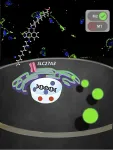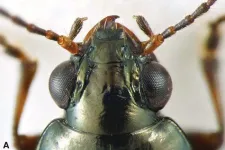(Press-News.org) A new study found that people who are currently suffering or face a high risk of post-traumatic stress disorder show particular patterns in four biomarkers measurable with a simple blood test. The findings suggest these biomarkers could be used to predict a person’s likelihood of developing PTSD, diagnose the disorder or monitor the response to treatment.
PTSD can occur after experiencing or witnessing a traumatic event. It is currently diagnosed based on symptoms such as flashbacks, difficulty sleeping or concentrating, negative thoughts, memory problems and avoidance of triggering situations. Since other disorders can have some of these same symptoms, it can be challenging to diagnose PTSD and assess changes in response to treatment.
This research, which involved over 1,000 service members, represents the largest prospective study to date to assess the biological markers of PTSD over time.
“This study provides valuable insights into the natural history of PTSD and the effectiveness of interventions, which can inform the development of treatment guidelines and improve the care for individuals suffering from PTSD,” said Stacy-Ann Miller, a researcher at Walter Reed Army Institute of Research in Silver Spring, Maryland. “Better methods of predicting or screening for PTSD could help to overcome the disorder by identifying individuals at high risk of developing PTSD and providing them with early intervention or prevention strategies. This could potentially reduce the severity of symptoms or prevent the disorder from developing altogether.”
Miller will present the new research at Discover BMB, the annual meeting of the American Society for Biochemistry and Molecular Biology, March 25–28 in Seattle.
Biomarkers, which reflect biological processes, can provide an objective measure of physiological changes associated with diseases such as PTSD. For the study, researchers analyzed four biomarkers in blood samples from active-duty service members taken before a 10-month deployment, three days after their return and three to six months after their return. The biomarkers have previously been linked to stress, depression, anxiety and mental health disorders. They included: the glycolytic ratio, a measure of how the body breaks down sugar to produce energy; arginine, an amino acid that plays a role in the immune and cardiovascular systems; serotonin, a chemical messenger that helps regulate mood, sleep and other functions; and glutamate, a chemical messenger that plays a role in learning and memory.
The researchers divided service members into groups based on measures of PTSD and mental resilience and compared the four biomarkers among the different groups. Participants were classified as having PTSD, sub-threshold PTSD or no PTSD depending on their clinical diagnosis and PTSD symptoms. Researchers classified participants’ resilience based on a combination of factors including PTSD, anxiety, sleep quality, alcohol use disorders, combat exposures, traumatic brain injury, and general physical and mental health. Previous studies have shown that people considered to have low resilience based on these measures are much more likely to develop PTSD after deployment than those with high resilience.
Comparing these biomarkers in people with different PTSD status and levels of resilience, the results showed that those with PTSD or sub-threshold PTSD had significantly higher glycolytic ratio and lower arginine than those with high resilience. People with PTSD also had significantly lower serotonin and higher glutamate than those with high resilience. These associations were independent of factors such as gender, age, body mass index, smoking and caffeine consumption.
The researchers said the biomarkers could help to predict which individuals face a high risk of PTSD, improve the accuracy of PTSD diagnosis and improve overall understanding of the drivers and effects of PTSD.
“Improved methods of screening and predicting PTSD could inform better treatment approaches by providing a deeper understanding of the underlying biological mechanisms of the disorder,” said Miller. “This could lead to the development of more targeted and effective treatments for PTSD or to identify specific subtypes of PTSD, which may respond differently to different treatments.”
Researchers cautioned that more research and validation would be needed to confirm the biomarkers’ utility in real-world settings.
The research was conducted in collaboration with the PTSD Systems Biology Consortium, a network of government and academic laboratories. Collaborators include Aarti Gautam, Ruoting Yang, Seid Muhie, Marti Jett and Rasha Hammamieh of the Walter Reed Army Institute of Research; Inyoul Lee, Kai Wang and Leroy Hood of the Institute for Systems Biology; Charles Marmar of New York University Langone Medical Center; Rachel Yehuda and Janine Florey of the Icahn School of Medicine at Mount Sinai; Synthia H. Mellon and Owen M. Wolkowitz of the University of California, San Francisco; Kerry Ressler and Francis J. Doyle III of Harvard University; and Bernie Daigle of the University of Memphis.
Stacy-Ann Miller will present this research during from 4:30–6:30 p.m. PDT on Monday, March 27, in Exhibit Hall 4AB of the Seattle Convention Center (Poster Board No. 103) (abstract). Contact the media team for more information or to obtain a free press pass to attend the meeting.
About the American Society for Biochemistry and Molecular Biology (ASBMB)
The ASBMB is a nonprofit scientific and educational organization with more than 12,000 members worldwide. Founded in 1906 to advance the science of biochemistry and molecular biology, the society publishes three peer-reviewed journals, advocates for funding of basic research and education, supports science education at all levels, and promotes the diversity of individuals entering the scientific workforce. www.asbmb.org
Find more news briefs and tipsheets at: https://discoverbmb.asbmb.org/newsroom.
###
END
M1 and M2 are activated macrophages that protect our immune system and maintain homeostasis. Interestingly, they are characterized by distinct and opposing phenotypes. M1 macrophages are known for their bactericidal and tumoricidal properties by secreting pro-inflammatory cytokines, while M2 macrophages facilitate immunosuppressive responses and help cancer progression. As such, reprogramming macrophages from M2 to M1 phenotype has been regarded as a significant interest in the view of potential cancer ...
People reveal more personal information when you ask them the same questions a second time – according to new research from the University of East Anglia.
A new study published today reveals how simple repetition can make people over-disclose, and potentially put themselves at risk of identity theft and cyber crime.
The research team say that understanding why people disclose personal data could help inform measures to address the problem.
From subscribing to online newspapers to completing customer surveys, our personal data is being mined continuously; the world’s most valuable resource is no longer oil, but data.
But for consumers who provide their personal ...
In February of this year, Graphene Flagship associated member Graphenest and manufacturing company Hubron International entered a new strategic partnership. Their shared aim is to explore the development and commercialization of graphene-based polymer masterbatch and compounds with unprecedented electromagnetic interference (EMI) shielding performance for electronic enclosures manufacturing.
This new product line will start with a graphene-based thermoplastic suitable to be implemented as a remarkable EMI shielding solution in medium-high and high frequencies (for 5G and beyond).
The agreement brings together Graphenest’s knowledge around graphene ...
A new drug combination for men with advanced prostate cancer has shown sustained increase in survival rates.
The results from the clinical trial of ENZAMET, co-chaired by Professor Christopher Sweeney, Director of the South Australian immunoGENomics Cancer Institute (SAiGENCI) that operates within the University of Adelaide, have been published today in The Lancet Oncology.
For people with metastatic hormone-sensitive prostate cancer, the addition of an androgen receptor blocker with enzalutamide ...
AUGUSTA, Ga. (March 28, 2023) – Cancer that has spread to areas like the lungs can apply the brakes to a natural pathway that should recruit killer T cells directly to where it has metastasized, scientists report.
That newly found strategy used by tumors that have spread — and are consequently more deadly — may help explain why sometimes promising immunotherapies designed to help the immune system kill cancer don’t, says Kebin Liu, PhD, cancer immunologist in the Department of Biochemistry and Molecular Biology at the Medical College of Georgia.
It also may mean an additional therapeutic maneuver is needed to stop some tumors, which ...
FOR IMMEDIATE RELEASE
March 27, 2023
Contact:
Jillian McKoy, jpmckoy@bu.edu
Michael Saunders, msaunder@bu.edu
##
Growing evidence suggests that e-cigarettes may serve as a less harmful alternative to smoking traditional cigarettes, but socioeconomic and racial inequities in cigarette and e-cigarette use are preventing certain populations from reaping these potential health benefits, according to a new study led by Boston University School of Public Health (BUSPH) and the Keck School of Medicine of the University of Southern California (Keck School of Medicine of USC).
Published in the American Journal of Preventive ...
Berkeley — When University of California, Berkeley, entomologist Kipling Will first heard that former Gov. Jerry Brown was hosting field scientists on his Colusa County ranch, he jumped at the chance to hunt for beetles on the property.
“I reached out and said, ‘Hey, I want to sample your beetles,’” Will said. “And [Brown] was quite game to let me come up there.”
Will, a professor of environmental science, policy and management, has travelled to all corners of California ...
Reston, VA—A new article in The Journal of Nuclear Medicine explores the potential for using ChatGPT, an artificial intelligence chatbot, in the field of nuclear medicine and molecular imaging. In the article, Irène Buvat, PhD, and Wolfgang Weber, MD, PhD, report on discussions they held with ChatGPT regarding several nuclear medicine and molecular imaging topics and provide their commentary on the pros and cons of using the chatbot.
Developed by OpenAI, ChatGPT is a natural language processing chatbot that can intelligently respond to questions. ...
“Ultimately, while both chronological and biological age appear to be important determinants of vaccine-preventable outcomes in older adults, the underlying context and mechanisms of their effects remain unclear.”
BUFFALO, NY- March 27, 2023 – A new editorial paper was published in Aging (listed by MEDLINE/PubMed as "Aging (Albany NY)" and "Aging-US" by Web of Science) Volume 15, Issue 5, entitled, “Parsing chronological and biological age effects on vaccine responses.”
Researchers ...
A University of Massachusetts Amherst nutrition scientist who has spent his career studying breast milk has demonstrated how beneficial microbes in the gut of infants use nitrogen from human milk to support pediatric nutrition and development.
“The molecules in breast milk not only feed the baby but also feed the baby’s microbiome,” says David Sela, associate professor of food science and director of the Fergus M. Clydesdale Center for Foods for Health and Wellness. “This ...






